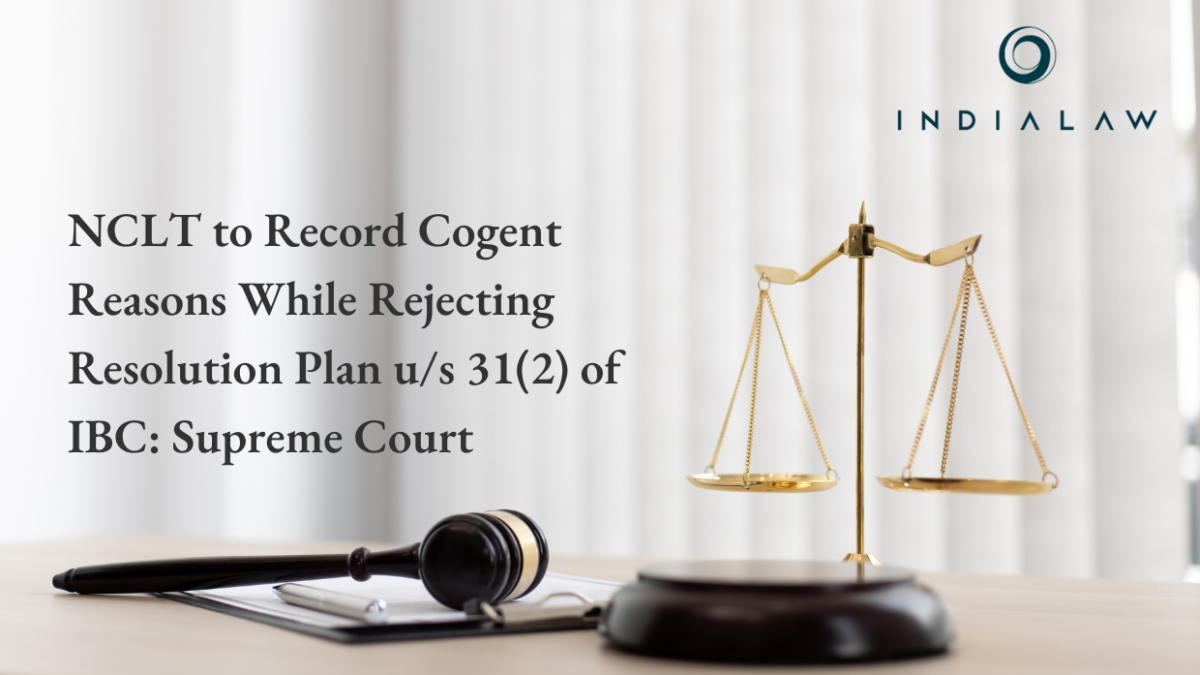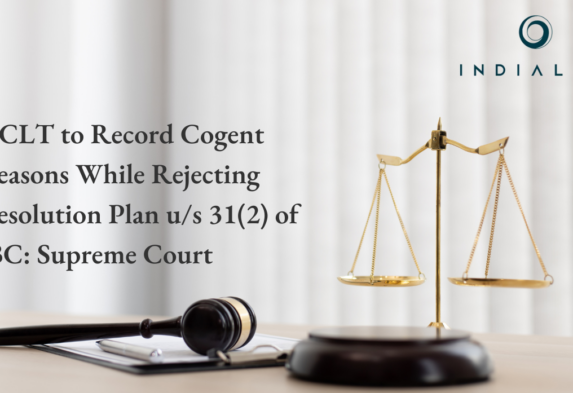NCLT to Record Cogent Reasons While Rejecting Resolution Plan u/s 31(2) of IBC: Supreme Court


The Hon’ble Supreme Court of India recently concluded that the National Company Law Tribunal (“NCLT”) while exercising its power under Section 31(2) of the Insolvency and Bankruptcy Code, 2016 (“IBC”) while rejecting a resolution plan must record cogent reasons in its order. The Supreme Court highlighted that the Courts and Tribunals are duty bound to record reasons while passing an order[i]. The SC stressed that ‘Reason is the heartbeat of every conclusion. Without the same, it becomes lifeless.
While hearing the appeal, the Supreme Court has set aside the order of the National Company Law Appellate Tribunal (“NCLAT”) that affirmed the order of the NCLT. In the Impugned Order NCLT has suspended the approval of resolution plan and directed the Official Liquidator to conduct re-valuation of the Corporate Debtor’s assets. The Supreme Court clarified that the NCLT may ask to conduct re-valuation of Corporate Debtor’s assets, if necessary, by adhering to statutory provisions of the IBC.
The judgment was passed by the Division-Judge Bench of the Hon’ble Supreme Court comprising Justices Vikram Nath and Ahsanuddin Amanullah. The Supreme Court held that “It is worthwhile to note that the Adjudicating Authority has jurisdiction only under Section 31(2) of the Code, which gives power not to approve only when the Resolution Plan does not meet the requirement laid down under Section 31(1) of the Code, for which a reasoned order is required to be passed. We may state that the NCLT’s jurisdiction and powers as the Adjudicating Authority under the Code, flow only from the Code and the Regulations thereunder.”
Table of Contents
- Facts of the Case
- Issue Involved
- Submissions by the Parties
- Findings of the Supreme Court
Facts of the Case
The corporate debtor (ACIL) was admitted into Corporate Insolvency Resolution Process (“CIRP”), it was a prominent manufacturer of precision engineering and automobile components. Ramkrishna Forgings had submitted a resolution plan for a payout of Rs. 129.5 crores, with haircut of approx. 94.25%, it was approved by the Committee of Creditors (CoC). The Resolution Plan was submitted for approval to the NCLT, however the same was kept in abeyance by the NCLT and the NCLT vide its Order dated 01.09.2021, directed the Official Liquidator to re-valuate and provide exact value of assets.
Being aggrieved by the order of the NCLT, the Resolution Professional filed an Appeal before the National Company Law Appellate Tribunal (NCLAT) that upheld the NCLT Order. The Appellant preferred an appeal before the Supreme Court against the order of the NCLAT.
Issue Involved
Whether the Adjudicating Authority-NCLT is vested with the jurisdiction and powers to direct revaluation in case where facts are undisputed and no objection was raised with regard to any deficiency/irregularity, either by the RP or the CoC, in finally approving the Resolution Plan which was sent to the NCLT for approval?
Submissions by the Parties
On behalf of the Appellant
The counsel on behalf of the Appellant submitted that the final resolution plan was approved by the CoC through a majority of 88.56% votes after extensive consideration. The RP had also got two reports prepared by two approved/registered valuers. The counsel further submitted that after taking care of all the statutory provisions and on basis of such reports and proper examination of the materials on record and having exercised its commercial wisdom, the Resolution Plan was approved by the CoC which was put up before the NCLT for its approval but the NCLT, passed the direction for revaluation without ascertaining any reason for such course of action.
The counsel further pointed out that there was no occasion for the NCLT to embark upon a totally alien procedure of getting the Official Liquidator (OL) involved in such valuation, for which a mechanism is already provided under the IBC and which is properly followed in the present case. The Counsel submitted that the OL is created by the Companies Act, 2013 and is not contemplated under the IBC which provides a specific mechanism for valuation to be conducted in respect of the assets of a Corporate Debtor under Regulation 27 and 35 of the CIRP Regulations.
On Behalf of the Respondent
In the present case, although the RP and CoC were arrayed as Respondents but having regard to the issues raised, the Supreme Court had requested the learned Solicitor General to assist. The written note submitted on behalf of the counsel states that the NCLT has no jurisdiction or power to sit in appeal over the commercial wisdom of the CoC and interference would be warranted only when the NCLT or the NCLAT finds the decision of the CoC to be wholly capricious, arbitrary, irrational and dehors the provisions in the IBC or the Regulations.
The counsel pointed out that the NCLT has no jurisdiction under Section 60(5) of the IBC, to decide any dispute with respect to valuation and take remedial steps to correct an erroneous valuation.
Findings of the Supreme Court
The Resolution Professional had duly complied with the statutory requirement. No objections were raised by the CoC pertaining to any deficiency or irregularity regarding the Resolution Plan submitted by the Appellant-Resolution Applicant.
The Supreme Court in its precedents has observed that the decision of the CoC is not subject to judicial interference or scrutiny. The commercial wisdom of the CoC should not be qualitatively examined by the judicial or quasi-judicial bodies. Further, the jurisdiction of the Adjudicating Authority or Appellate Authority cannot be extended to enter upon the merits of the decision of the CoC.
The Supreme Court stressed on the point that unless the resolution plan violates Section 30 of the IBC (submission of resolution plan), or the same is in violation of Section 31 (approval of resolution plan), interfering with commercial wisdom of CoC is not correct.
NCLT can reject the resolution plan through a reasoned order
Under Section 31(2) of IBC the NCLT is empowered to reject a resolution plan when it does not satisfy the requirement provisioned under Section 31(1) of IBC. The NCLT has to pass a reasoned order for rejecting a resolution plan and the power of rejection needs to be exercised within the domain of the IBC and the Regulations.
Reliance was placed on the decisions based on the similar lines in the cases of Kranti Associates Private Limited v Masood Ahmed Khan, (2010) 9 SCC 496 to Manoj Kumar Khokhar v State of Rajasthan, (2022) 3 SCC 501, wherein it was clarified that the Court and quasi-judicial authority must record reasons for its decision.
Re-valuation of assets can be directed by the NCLT only within the domain provided under the IBC
The Supreme Court stated that the NCLT should exercise power to direct re-valuation only when it is necessary by strictly complying to the statutory provisions of the IBC. It added that “If a matter where the facts are stark comes to light, the same would have to necessarily be dealt with by the NCLT within the four corners of the Code itself, having due regard to the extant circumstances. It is for the NCLT to exercise power strictly within the domain permitted by the Code.”
Based on the aforesaid findings of the Supreme Court the orders of the NCLAT and NCLT were set aside. The matter was remanded back to the NCLT, and it was directed to pass reasoned orders in application for approval of RP.
The Supreme Court emphasized that the order of the NCLT was based on presumptions that the fair value of the assets was not projected properly and hence needed re-valuation. The NCLT provided no justified reason to direct the Official Liquidator to re-valuate the assets of the corporate debtor and exceeded its jurisdiction by interfering in the CIRP proceedings. The Supreme Court underscored that the order of the NCLT cannot stand for being an unreasoned order wherein the Tribunal is duty bound to pass reasoned orders.
[i] Ramkrishna Forgings Limited v Ravindra Loonkar & Anr., CIVIL APPEAL No.1527 OF 2022




